Three Reasons I Drink Kombucha
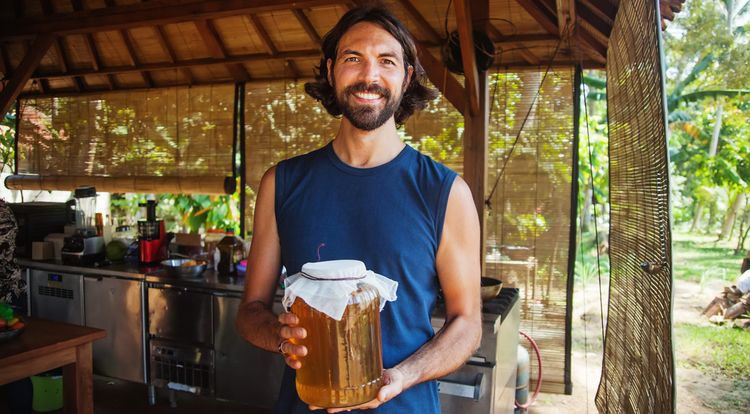
The first time a friend told me about kombucha, I’ll be honest— I was a little grossed out.
My friend was telling me how she’d made it herself using “a bacteria and yeast colony.”
Um, what?! I didn’t know what to make of that. When she offered me a glass, I declined as politely as I could. Before I could leave, however, my friend made me promise to do my research.
“I’m telling you, Nicholas,” she said, “this stuff is just amazing!”
Well, I kept my promise, and I did my research. I was blown away! I decided to take the plunge, buy a bottle, and give it a try. My health has never been the same since.
So, what is kombucha exactly?
Simply put, kombucha is fermented tea. It’s made by adding sugar and what’s known as a “SCOBY” (a symbiotic colony of bacteria and yeast) to a base of black or green tea.
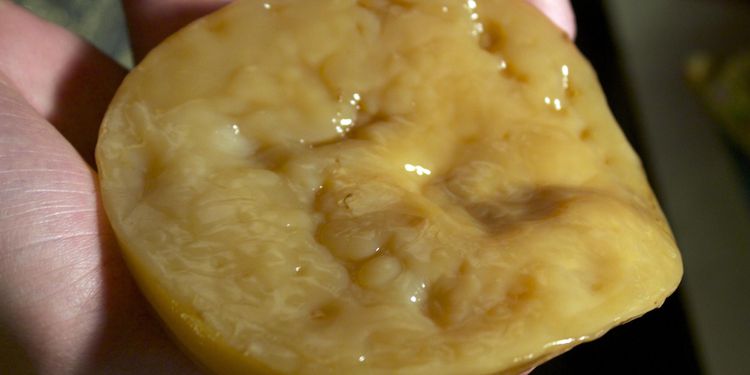
During the brewing process, the SCOBY ferments the sugar, which fills kombucha with healthy enzymes, b-vitamins, probiotics, and beneficial acids like gluconic, lactic, and acetic. This fermentation process also produces vinegar and carbonation, leading kombucha to taste a lot like vinegary soda.
Yep, vinegary soda. Let’s just say that, in its pure form, kombucha is…an acquired taste. Thankfully, kombucha can be flavored with all sorts of delicious things, such as fruit, citrus, or ginger.
So why do I drink kombucha?
Why is Kombucha So Great?
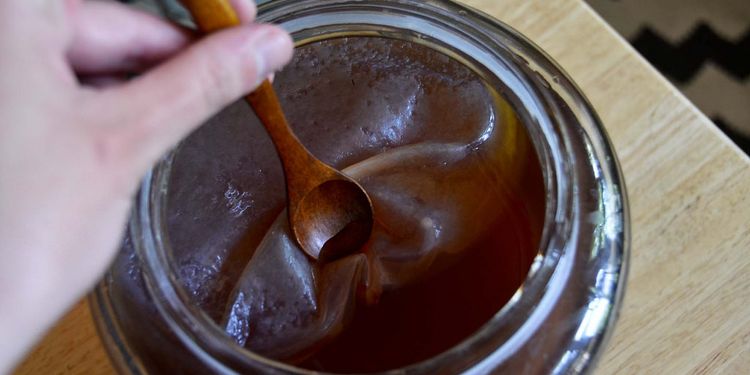
1. It Powers You Up
First and foremost, I drink kombucha because it energizes me. And not in the spike-crash way sugar does.
*Kombucha is jam-packed with iron, which increases hemoglobin levels in your blood. This brings more oxygen to your tissues and helps the cells of your body produce more energy. Kombucha also contains small amounts of caffeine and b-vitamins, which help your body stay energized throughout the day.
Studies have also shown that drinking kombucha improves metabolism and helps keep fat from accumulating. What’s more, kombucha has high levels of acetic acid and polyphenols, both of which have been proven to support weight loss. Less weight and less fat means more energy!
2. It Boosts Your Immunity
Kombucha contains a powerful antioxidant known as D-saccharic acid-1, 4-lactone (DSL), which has been clinically proven to decrease oxidative stress. The vitamin C in kombucha combines with DSL to protect your cells from oxidative damage, tumors, and inflammatory diseases and support the immune system.
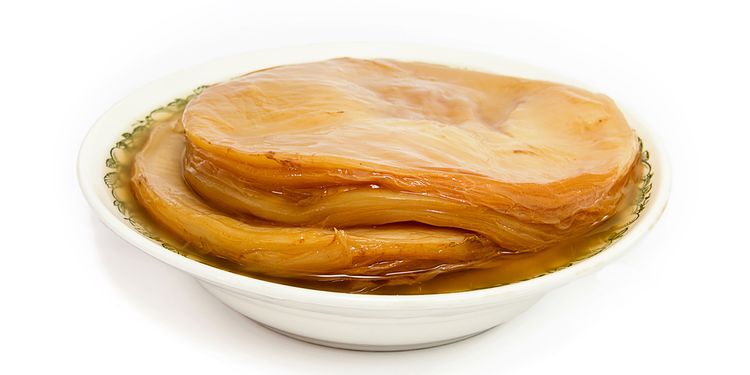
The glucaric acid in kombucha reduces your risk of cancer, and kombucha’s high levels of glucosamines support healthy collagen in your joints and throughout your body. As an added bonus, kombucha helps prevent arthritic pain and reduce wrinkles by increasing the production of synovial hyaluronic acid in the body.
3. It Cleanses Your Body
Kombucha is a detoxifying powerhouse! One study showed that drinking kombucha helps protect liver cells from oxidative injury, even keeping them healthy while being exposed to toxins. Since oxidative stress is so often a root cause of liver damage, kombucha could even potentially reduce the risk of liver disease!
Kombucha also encourages body detoxification by supporting the digestive system. The high levels of antioxidants fight free radicals that disrupt digestion. Kombucha is also packed with enzymes, probiotics, and beneficial acids that help prevent and heal digestive issues like leaky gut, candida overgrowth, and stomach ulcers.
Finally, kombucha helps restore and maintain healthy bacterial levels in the gut by filling the gut with beneficial bacteria.
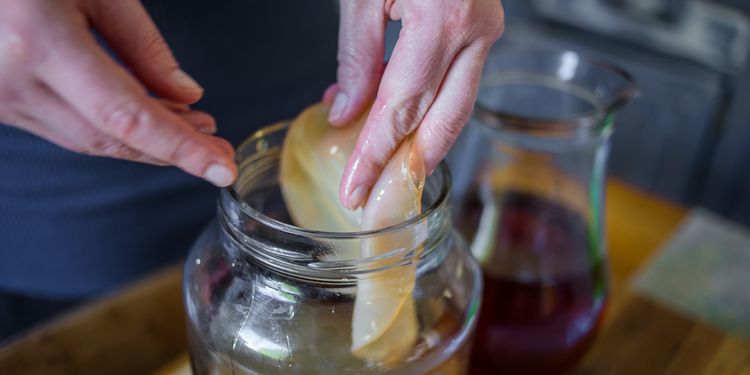
How Do You Make Kombucha?
While you can buy bottles of kombucha in most health food stores, it’s much more fun (not to mention cheaper) to make it yourself!
The following recipe will make 8 cups of kombucha:
- Bring 8 cups of water to a boil. You can use filtered, distilled, or tap water— your preference.
- Once the water is boiling, remove from heat and add ½ cup of organic cane sugar and 4 bags of tea. Some people feel cane sugar is best, while others have successfully used raw honey. Also, while black tea is used most often, green tea works just as well.
- Steep the tea for 15 minutes, then remove tea bags.
- Let the tea-sugar mixture cool to room temperature, then transfer to a large glass/metal jar or bowl. Avoid plastic or ceramic bowls to avoid chemicals potentially leaching into your brew.
- Add 1 SCOBY disk (purchased in a health food store or online) and 1 cup of premade kombucha (bought in a store or taken from a previous batch).
- Cover the jar/bowl with a dish towel or large piece of cloth and secure it in place with a rubber band or tie. You want the entire opening to be covered, using something thin enough to allow air to pass through. Avoid using cheesecloth, as it is too porous and will let particles (dust, food, etc.) through.
- Let the kombucha sit and ferment for 7-10 days. The more time the kombucha sits, the more powerful it will be, in both potency and sour taste. Some people have let kombucha sit and ferment for up to a month— it’s really up to you.
- Once you’re happy with the taste, transfer the kombucha to a refrigerator to cool for at least 24 hours. Once cooled, it’s ready to drink!
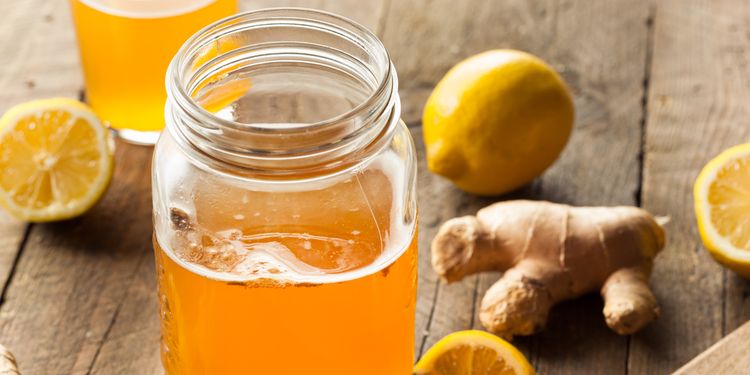
For added flavor, try adding fresh-squeezed lemon, lime, cranberry, or orange juice, ginger root juice, or blended berries. You can add these flavors after the fermentation process is complete or a day or two before the kombucha is done for intensified flavor.
Note: You’ll notice that during the fermentation process, your SCOBY disk will “grow” a second, smaller SCOBY disk underneath. You can store this new “baby” SCOBY disk in a glass of kombucha at room temperature (with the first “mother” SCOBY disk attached or not) for multiple weeks to make new batches of kombucha with.
Some sources say that the original “mother” SCOBY disk can also be reused to make new batches of kombucha for up to a month. After a month, it should be thrown away.
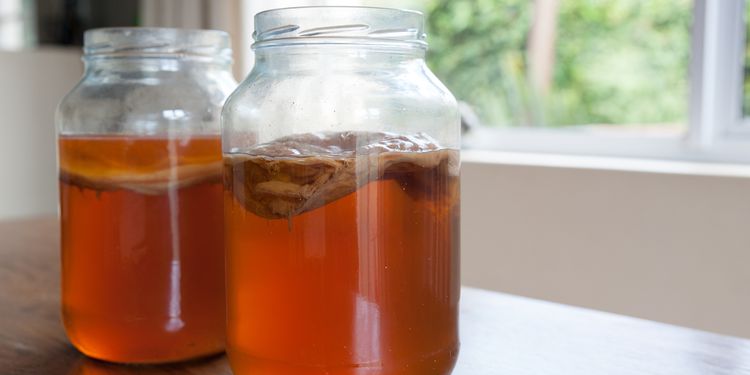
What to Know About Kombucha
While most people experience nothing but positive effects drinking kombucha, there is the possibility of negative side effects.
The following people should be careful drinking kombucha:
- Those with weak immune systems: While store-bought kombucha will have gone through stringent quality control tests, homemade batches are more susceptible to bacterial contamination. For this reason, make sure to always use sterile equipment and high-quality ingredients when brewing your own kombucha, especially if you have a weak immune system due to diseases like HIV/AIDS.
- Those with high sensitivities to sugar, caffeine, and/or alcohol: Kombucha’s fermentation process produces small quantities of alcohol (about 1%), sugar, and caffeine. Pregnant or nursing women and people with diabetes or digestive issues like IBS should exercise caution.
- Those with stomach ulcers, heartburn, or sensitivity to acidic foods: Kombucha is a highly acidic beverage, and it can exacerbate these issues. Some have reported stomach upset, allergic reactions, and infections after drinking kombucha.
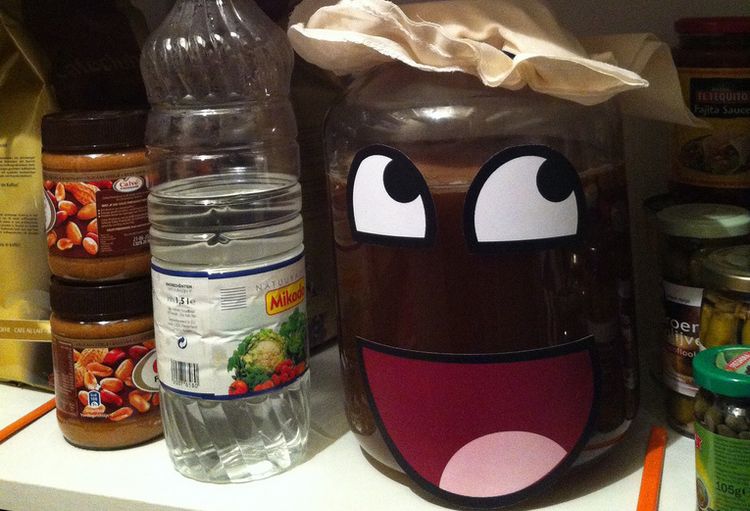
Summary
Kombucha is a powerfully healthy beverage! Drinking kombucha regularly can benefit your health in numerous ways, including energizing your cells, improving your metabolism, supporting your immune system, cleansing your body, and balancing your gut’s bacterial levels.
If you’ve never tried kombucha before, I recommend you start with a store-bought brand to limit your risk of exposure to bad bacteria. Start with just 8 ounces a day and slowly work your way up to higher amounts as your body permits.
Once you’ve determined that your body is receptive to this amazing brew, I highly recommend experimenting with making your own! Not only is it cheaper than buying in the store, but you also have nearly endless possibilities when it comes to experimenting with added flavors.
My favorite recipe is pina colada kombucha! Just add sliced pineapple, 3 tablespoons of pineapple juice extract, and 1 teaspoon of organic coconut extract.
Happy brewing!
